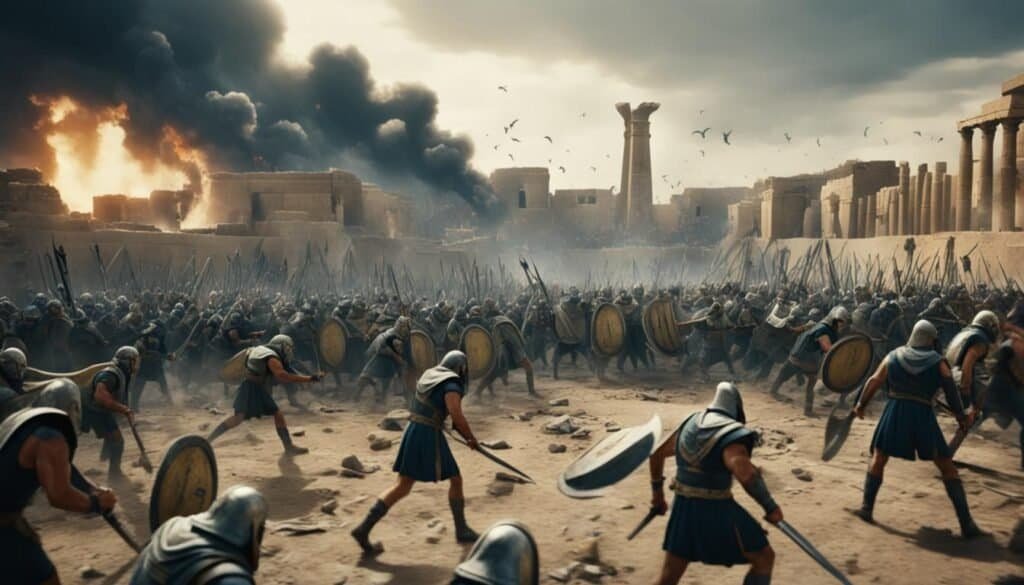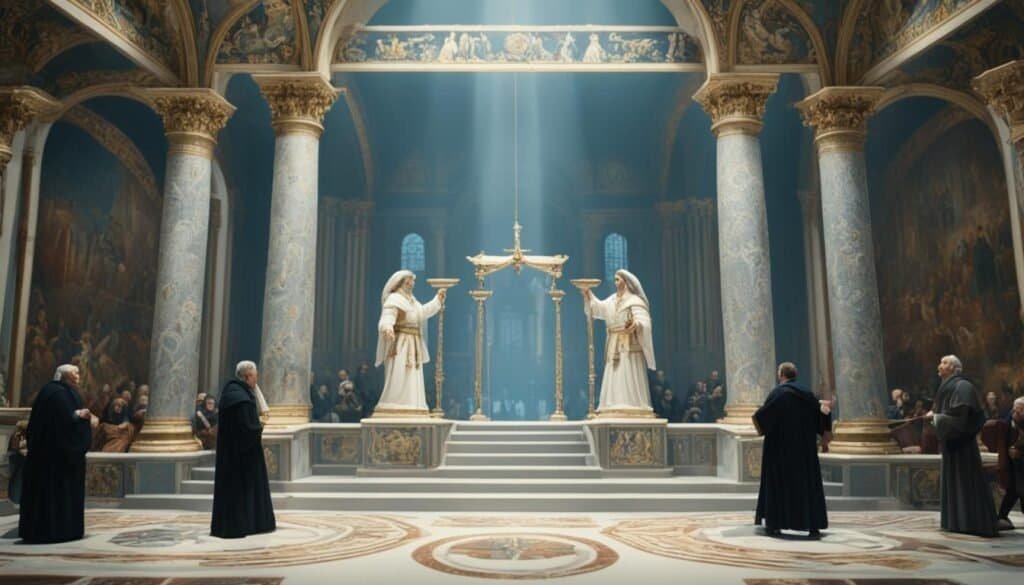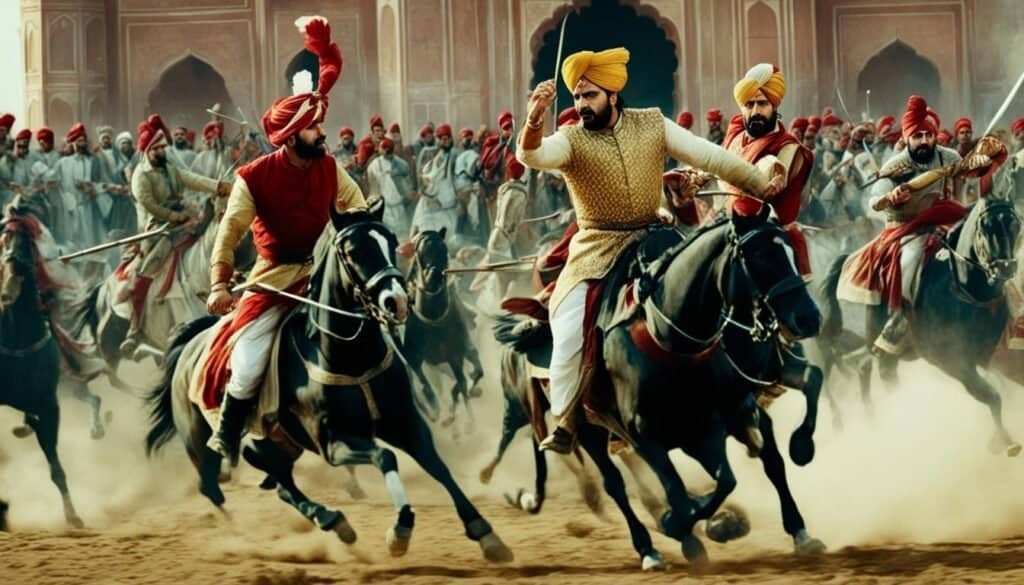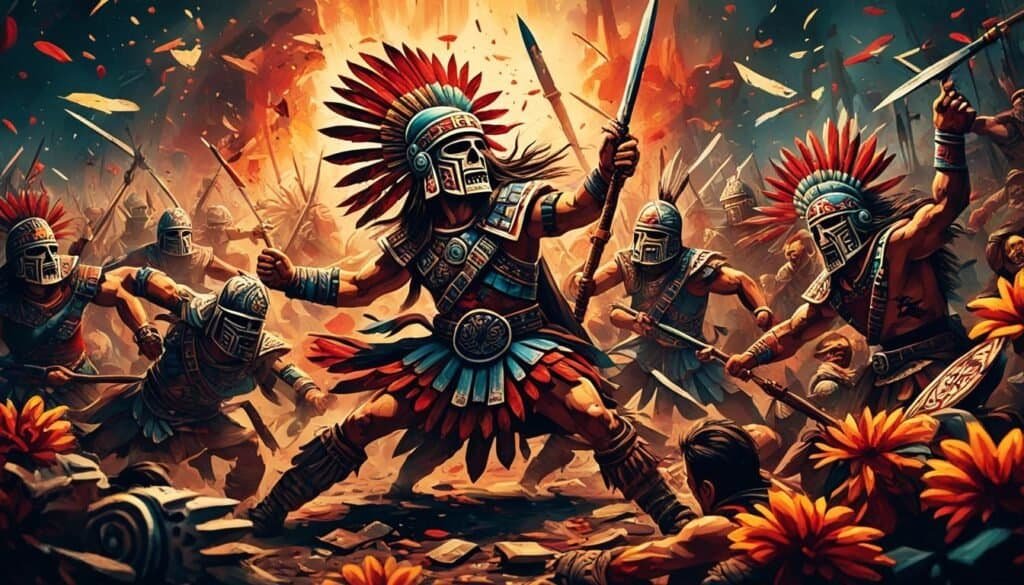Have you ever thought about what starts epic power struggles? what makes people and countries fight fiercely for divine favor? Let’s dive into the violent world of power fights. We’ll find out how far individuals and nations have gone to get blessings in war and leadership.
Key Takeaways:
- Throughout history, power struggles have been fueled by the desire for divine favor.
- Jealousy, competition, and the pursuit of blessings have led to epic conflicts.
- From biblical rivalries to colonial-era conquests, power struggles shape our world.
- These conflicts highlight the enduring human quest for power and divine favor.
- Stay tuned as we delve into the fascinating stories behind each epic power struggle.
The Ultimate Sibling Rivalry: Cain vs. Abel (Biblical)
In ancient history, a tale of rivalry was told about two brothers, Cain and Abel. This biblical story shows us how envy and the quest for admiration can lead to tragic events. It started when God favored Abel’s gift over Cain’s.
Not being chosen by God made Cain jealous of his brother. This jealousy turned into a dark yearning for revenge. It was a seed of hatred that grew between them, paving the way for a horrible crime.
Things took a tragic turn when Cain murdered his brother Abel. This marked the first-ever recorded murder in human history. The story warns against the dire consequences of jealousy and an unhealthy desire for divine favor.
“Then the Lord said to Cain, ‘Why are you angry? And why has your countenance fallen? If you do well, will you not be accepted? And if you do not do well, sin lies at the door. And its desire is for you, but you should rule over it.'” – Genesis 4:6-7
This tale goes beyond just siblings fighting. It delves into critical discussions on human nature, morals, and the chase for divine acceptance. It cautions us about the real perils of jealousy and reminds us of the value of reflection and taking responsibility.
Divine Favor: A Catalyst for Conflict
Throughout history, seeking divine favor has sparked significant conflict. The rivalry between Cain and Abel sheds light on how this desire can lead to destructive outcomes. It teaches us to pursue divine favor with humility and respect for others, avoiding self-serving actions.
| Key Elements | Significance |
|---|---|
| Sibling Rivalry | Highlights the destructive nature of jealousy and rivalry between siblings. |
| Divine Favor | Shows the consequences of seeking divine favor without humility and respect for others. |
| Murder | Illustrates the extreme lengths individuals may go to when driven by resentment and envy. |
| Lessons Learned | Reminds us of the importance of cultivating healthy relationships and seeking divine favor in a responsible and balanced manner. |
The War of the Roses (England)
England’s history holds few events as impactful as the War of the Roses. This civil war spanned several decades. Noble houses fought fiercely for the English throne. They believed they were chosen by God to rule.
The war began in the 15th century. It pitched the red rose of the House of Lancaster against the white rose of the House of York. This rivalry sparked many bloody battles, giving the war its name.
This conflict was as much about divine favor as it was about politics. Each side felt chosen by God to rule England. This belief made the war ruthless and bloody, with no side willing to bend.
The War of the Roses deeply divided England. It damaged the countryside and weakened the monarchy. The fighting also took place through marriages and betrayals, further complicating the situation. Its complexity and length made the social division and historical impact deep and lasting.
Key Figures of the War of the Roses
“Throughout this tumultuous period, England witnessed the rise and fall of many influential figures, each vying for divine favor and claiming their rightful place on the throne.”
The notable leaders of the War of the Roses showcased the struggle for the throne. Henry VI, a Lancaster king, faced challenges from the Yorkists. Richard, Duke of York, fought hard for the Yorkist cause and his claim to the throne.
Yet, Edward IV of the House of York emerged as the ultimate victor. His military skill and strong claim to divine favor helped secure Yorkist control. He briefly united the factions under his rule.
The image above shows the red and white roses, symbols of the warring houses during the War of the Roses.
The Aftermath and Legacy
“The War of the Roses forever altered the course of English history, leaving a lasting impact on the monarchy and the nation as a whole.”
After the war, the House of Tudor, led by Henry VII, gained power. Henry VII’s reign brought peace and ended the Plantagenet dynasty. The Tudors merged the red and white roses into the Tudor Rose, symbolizing their effort for unity.
The war highlighted the search for divine favor and rightful rule. This would influence English politics and monarchy for centuries. It warned against unchecked ambition, raising questions about succession and divine fate.
Overall, the War of the Roses reflects the human drive for power and divine favor. It shows the lasting effects of these struggles in history.
Egyptian Succession Wars
In ancient Egypt, people fought for the throne and the blessing of the gods. These fights were fierce and shaped Egyptian history. They were not just about power but also who had the gods on their side.
The pharaoh was seen as having the gods’ favor. So, becoming pharaoh meant more than ruling – it meant having the gods’ support, too.
One famous conflict occurred during the 18th Dynasty. It was between Hatshepsut and Thutmose III. She became pharaoh when her husband died and Thutmose III was still a child. This move led to a big power struggle.
Another well-known war was between Seti I and his son, Ramesses II. Ramesses II wanted to make his mark and gain the gods’ favor. This caused problems with his father.
But not only royals fought for power. High-ranking nobles and military leaders also wanted a bigger role in governing. This led to complex fights in Egyptian society.
The Egyptian succession wars were about more than just political power. They were about getting the gods’ favor, too.
The struggles among royals were about more than just gaining power. It was also about who the gods favored. The belief in divine support was very important in these battles.
The pharaohs believed that with divine favor, they could ensure good times for the people. They thought they could keep the earthly and divine worlds connected peacefully.
The fights for power in Egypt were also about the gods. Both sides thought their rule would be the best for the country. The wars were very serious, as they could change the future of Egypt.

| Succession War | Rivaling Parties | Significance |
|---|---|---|
| Hatshepsut vs. Thutmose III | Powerful queen vs. her stepson | Shifted the balance of power within the kingdom |
| Seti I vs. Ramesses II | Father vs. son | Tested the legitimacy and the divine blessing of the chosen pharaoh |
| Nobles and military generals | Vying for influence and power | Shaped the dynamics of Egyptian society and its power structure |
The battles for the throne greatly affected Egypt. They helped define the role of the pharaoh in keeping peace and wealth. The fights show how politics, religion, and power blended in ancient Egypt.
The Trojan War (Greek Mythology)
In Greek mythology, the Trojan War is a legendary conflict that still intrigues us today. This epic war started when Helen, known as the most beautiful woman, was taken. The Greeks believed owning her would bring them favor from the gods. And so, they fought a long battle to claim her back.
Paris from Troy kidnapped Helen, causing a big uproar. Greeks, upset at this, vowed to bring her home. They felt it was their duty to return her and win the favor of the gods again.
“For the loss of Helen, whose beauty instigated this great conflict, we Greeks have vowed to reclaim her. We aim to restore divine favor through a victory so glorious.”
The war lasted a decade, showing the high price of seeking divine favor with violence. Both sides had gods on their team; Olympians favored the Greeks, and Aphrodite was with the Trojans. This divine backing turned the war into a battleground of both humans and gods.
The Trojan War isn’t just about battles and bravery. It is a warning about the cost of trying to win divine blessings through conflict. It teaches us that war for the sake of divine favor can have awful outcomes, even if we believe our cause is just.
The Fall of Troy
After ten years, the Greeks devised a plan to enter Troy. They built a giant wooden horse that hid soldiers within it. This trickery opened the city’s gates, leading to Troy’s fall.
https://www.youtube.com/watch?v=R30CPoVcY0o
“The city of Troy fell as the Greeks, believing that divine favor was on their side. They ingeniously used the wooden horse to breach the outer defenses.”
The fall of Troy is a story of the dangers of fighting for divine favor through war. It shows us that true blessings and abundance cannot be attained by force. The outcome of these violent struggles can be catastrophic.
Investiture Controversy (Medieval Europe)
In medieval Europe, a big fight happened between popes and kings. It’s known as the Investiture Controversy. They argued about who could pick church leaders.
This fight was about more than religion. It was a big power struggle. The battle showed how church and state powers fought for control in medieval Europe.
This battle was all about divine blessing for a King’s rule. Popes wanted to choose church leaders. This way, these leaders would agree with what the popes wanted for both religion and politics.
The Investiture Controversy was a huge deal for the people back then. It changed how religion and politics worked together in medieval Europe.
The Clash Between Popes and Kings
Understanding the Investiture Controversy means seeing who had power back then. The Catholic Church had a lot of say in people’s lives and how kingdoms were run.
Kings needed the church’s approval to be seen as truly ruling with God’s will. But the church also needed the support of kings to keep its earthly power strong.
| Pope’s role in the Investiture Controversy | King’s role in the Investiture Controversy |
|---|---|
| The pope claimed the divine authority to appoint bishops and church officials. | The king asserted his secular authority to install bishops and church officials. |
| The church viewed the appointment of church officials as a spiritual matter, and it contested the king’s interference in ecclesiastical affairs. | The king considered the appointment of church officials as a matter of governance and saw it within his rights to control ecclesiastical appointments. |
| Popes relied on their spiritual influence to challenge the secular power of kings and assert their supremacy. | Kings utilized their political authority to resist papal influence and maintain control over church appointments. |
The Investiture Controversy became a huge power fight. Popes kicked out kings from the church. Kings wanted more control over the church and pushed back against the popes. The fight showed the struggle for power in medieval Europe and influenced European history.

The Legacy of the Investiture Controversy
This fight highlighted the tug-of-war between the church and the state in medieval times. Its impact was lasting, shaking up politics and religion.
It led to a big change: church and state started to separate. Monarchs began to pick church officials, challenging the pope’s old authority.
This argument also sparked big change movements. Like the Gregorian Reforms to make sure kings didn’t meddle too much in church matters.
Studying the Investiture Controversy opens a window to medieval Europe. We see the struggle over divine power and control played out.
The Mughal Succession Wars (India)
After India’s powerful Mughal emperors died, their sons began a series of fights. Each wanted to be the next emperor. These battles were not just about politics. They were a fight to rule from God.
The Mughal dynasty was known for its beauty and cultural advances, but also for its internal battles. With a vast empire to inherit, each new emperor’s rise triggered fierce competition. These struggles took place alongside secret plots and changing allegiances.
Mughal princes believed God favored them to rule. So, they fought fiercely to prove they were the true heirs. The battles saw harsh war tactics and alliances. Lives were lost as thrones shifted and kingdoms fell.
The Mughal succession wars not only showed how ambitious and cunning the contenders were. They also showed how important religious authority was in ruling India. People believed being a ruler was more than politics. It was also God’s choice.
In the midst of all the fighting, the Mughal empire weakened. This allowed local leaders to break free, marking the empire’s decline. These wars were a critical moment in Indian history. They led to the rise of independent states and eventual European colonization.
The Mughal succession wars highlight a connection between power, religion, and God’s favor. They reveal the extreme measures people would take to secure their position as the rightful ruler.

| Key Figures | Years of Conflict | Main Battles |
|---|---|---|
| Humayun, Akbar, Jahangir, Shah Jahan, Aurangzeb | 1526-1707 | Panipat, Haldighati, Samugarh, Karnal |
| Princes Kamran, Askari, Murad, Dara Shikoh | ||
| Aurangzeb vs. Dara Shikoh |
The Aztec Flower Wars
The Aztec Flower Wars were special battles between Aztec city-states. They fought to take prisoners for sacrifice. This was seen as a way to make the gods happy and get more blessings for the land. It shows how various cultures seek favor from their deities.

The Ritualistic Battles
The Aztec Flower Wars were different from wars we know today. They were not fought for land. Instead, they were a religious practice linked to Aztec beliefs. These battles were between cities that had rivalries.
The warriors aimed to take enemies back alive to not kill them. They did this to give the gods what they wanted. Those captured were used in sacrifices. This was a big part of the Aztec’s religious ceremonies.
The Aztecs thought these battles and sacrifices kept a good relationship with their gods. They believed offering up prisoners meant bringing people and gods closer. This practice was key for the Aztec civilization’s well-being and continued blessings.
Interpreting Divine Favor
For the Aztecs, joining the Flower Wars and sacrificing humans was about religious commitment. They believed doing these actions would make the gods happy. Then, they could get the gods’ blessings of peace, wealth, and safety for their towns.
The Aztec Flower Wars used war and sacrifice to find favor with the gods. The Aztecs thought this brought order to the universe. It was a way for them to meet their religious duties and keep the support of their deities.
The Aztec Flower Wars were a unique way the Aztec people showed their religious beliefs. It helped them understand divine favor. They were willing to fight and do rituals to keep this favor.
The Legacy of the Aztec Flower Wars
The Aztec Flower Wars were more about seeking blessings than winning land. They were part of a deep religious system aiming for divine favor. The Aztecs thought these battles and sacrifices kept them close to their gods.
| Key Aspects | Significance |
|---|---|
| Ritualistic Battles | Showcased the Aztecs’ commitment to religious practices and their interpretation of divine favor |
| Sacrifice | Played a central role in maintaining the flow of divine blessings and the prosperity of the Aztec civilization |
| Religious Devotion | Reflected the deeply ingrained religious beliefs and practices of the Aztecs |
| Social and Cultural Impact | Shaped the Aztec society by reinforcing the importance of religious ceremonies and rituals |
The legacy of the Aztec Flower Wars highlights the significance of religion. It shows how far people would go for divine blessings. These wars are a lasting example of Aztec religious beliefs, shaping their history and culture.
The Scramble for Africa (Colonial Era)
The Scramble for Africa, known as the colonial era, was a time when European powers fought for African land. This intense struggle changed Africa’s history and growth.
European countries wanted Africa’s resources and territory for themselves. They claimed they were helping by spreading Christianity and introducing Western ways.
Great Britain, France, Germany, Belgium, and Portugal played bold moves to get their piece of Africa. They drew borders without considering local cultures or people, leading to issues that still exist.
Europeans believed they were making Africa better, but in truth, they caused great harm. The process of colonizing Africa brought pain, abuse, and loss of local traditions.
The Scramble paints a dark picture in Africa’s history, with Europeans acting out of greed and power. Its effects linger today, seen in unstable politics and economic inequality in Africa.
In the pursuit of divine favor and the proclamation of a civilizing mission, European powers unleashed a wave of colonization that forever altered the course of African history.
Impact on Africa’s Cultural Landscape
European colonization dramatically transformed Africa’s culture. Europeans enforced their languages, religions, and ways on Africans, often destroying their own traditions along the way. The deep influence of Christianity and Western culture continues to impact Africa’s identity.
Legacy of the Scramble for Africa
The Scramble left a lasting and mixed impact on Africa. While some see benefits like education and new infrastructure, others highlight the harm from exploitation and division.
Africa still bears the marks of the Scramble in its challenges. Yet, the continent’s journey to self-rule shows the resilience of its people. They are crafting their own futures despite the Scramble’s lasting effects.
How Do the Struggles of the Patriarchs Relate to the Epic Power Struggles Over Blessing?
The biblical narratives highlight a profound connection between familial dynamics and societal constructs. The patriarchal challenges explored illustrate how figures like Abraham and Jacob faced conflicts over blessings, mirroring broader power struggles. These stories reveal the intricate interplay of faith, ambition, and divine favor in shaping destinies across generations.
Conclusion
Throughout history, epic power struggles have shaped the world. They come from the intense chase for divine favor. From stories in the Bible to battles during the Colonial era, these struggles have played a key part in our history.
This quest for power has been ongoing. Both individuals and groups strive for divine favor in their goals of war and control. The dedication to obtain this divine blessing has led to shocking levels of bloodshed and violence.
Studying these historical struggles offers insights into human nature. We see our constant drive for power and divine favor. From brothers Cain and Abel’s rivalry to the race for control in Africa, these events have deeply influenced our history.
Affiliate Disclosure: "As an Amazon Associate I earn from qualifying purchases made from links in this post. We are a participant in the Amazon Services LLC Associates Program, an affiliate advertising program designed to provide a means for us to earn fees by linking to Amazon.com."

